css属性position: static|relative|absolute|fixed|sticky简单解析
CSS position属性规定一个元素在文档中的定位类型。top,right,bottom和left属性则决定了该元素的最终位置。
Object.style.position = static | relative | absolute | fixed | sticky
先解释下什么是文档流:
将窗体自上而下分成一行行, 并在每行中按从左至右的顺序排放元素,即为文档流
static 静态定位(默认)
默认值,元素出现在正常的流中。位置设置为static的元素,它始终处于正常文档流给予的位置,不影响其他元素的偏移。(static 元素会忽略任何 top、bottom、left 、 right 或者 z-index 声明)。
relative 相对定位
位置设置为 relative 的元素,相对于其正常位置进行定位,该元素会在正常文档流中会占据位置,从而不影响其他元素的偏移。此元素的位置可通过 "left"、"top"、"right" 以及 "bottom" 属性来规定。因此 "left:20px" 会将元素移至元素正常位置左边 20 个像素的位置。
我们用个简单例子分析
正常文档流
<div style="width: 200px; height:200px; background-color:green;">
<div style="width: 100px; height:100px;background-color: #cff;">
1
</div>
<div style="width: 100px; height:100px; background-color: #ccf;">
2
</div>
</div>
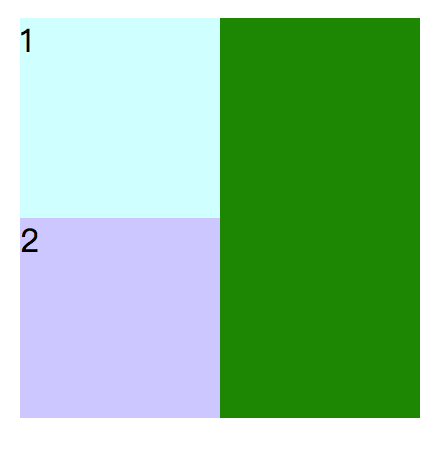
加了relative之后的布局
<div style="width: 200px; height:200px; background-color:green;">
<div style="width: 100px; height:100px;background-color: #cff; position: relative;top: 10px;left:10px;">
1
</div>
<div style="width: 100px; height:100px; background-color: #ccf;">
2
</div>
</div>
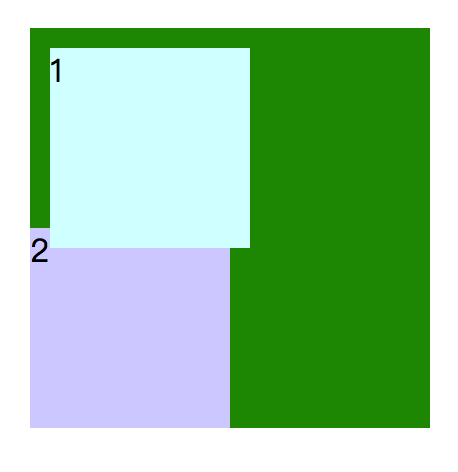
加上margin/padding/border之后的布局
记住一点,relative是相对自身定位。加上margin/padding/border之后,是在这些属性起作用之后,再来计算relative。
<div style="width: 200px; height:200px; background-color:green;">
<div style="width: 100px; height:100px;background-color: #cff; margin: 10px; padding: 10px; border: 10px solid red; position: relative;top: 10px;left:10px;">
1
</div>
<div style="width: 100px; height:100px; background-color: #ccf;">
2
</div>
</div>
加上margin/padding/border之后图对比:
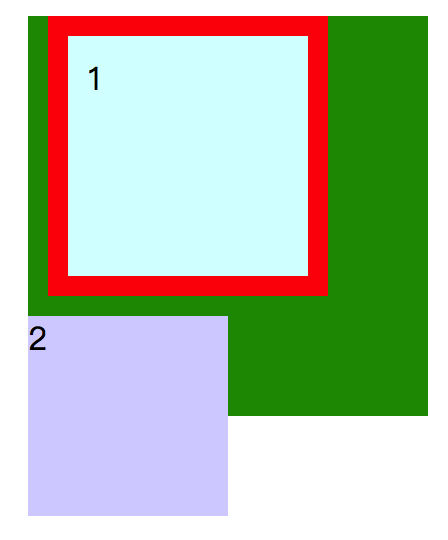
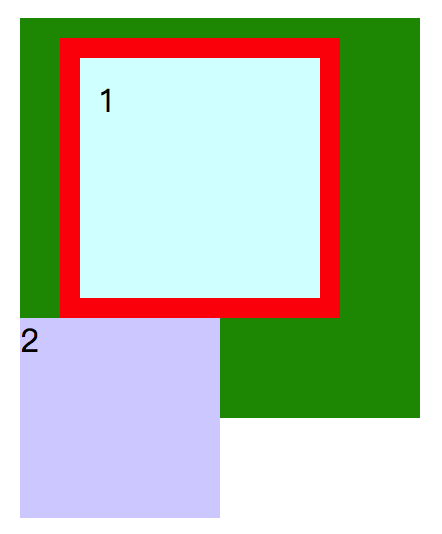
absolute 绝对定位
位置设置为 absolute 的元素,相对于非`static`定位以外的第一个父元素进行绝对定位,脱离了正常文档流,该元素不占据正常文档流空间,因此会影响其他元素的偏移。此元素的位置可通过 "left"、"top"、"right" 以及 "bottom" 属性来规定。
我们用个简单例子分析
正常文档流
<div style="width: 200px; height:200px; background-color:green; position: relative;">
<div style="width: 100px; height:100px;background-color: #cff;">
1111111111
</div>
<div style="width: 100px; height:100px; background-color: #ccf;">
我是2,我在下面 .....我是2,。我在下面,会被覆盖?
</div>
</div>
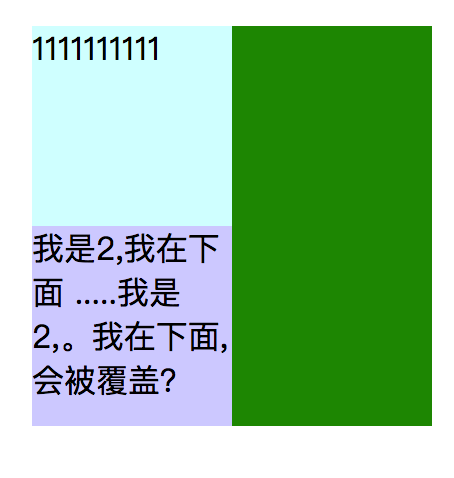
加了absolute之后的布局
设置为绝对定位之后,被定位的元素会以 “第一个设置了定位的祖先元素” 定位,这里就是第一个div元素。
<div style="width: 200px; height:200px; background-color:green; position: relative;">
<div style="width: 100px; height:100px;background-color: #cff; position: absolute;top: 10px; left: 10px;">
1111111111
</div>
<div style="width: 100px; height:100px; background-color: #ccf;">
我是2,我在下面 .....我是2,。我在下面,会被覆盖?
</div>
</div>
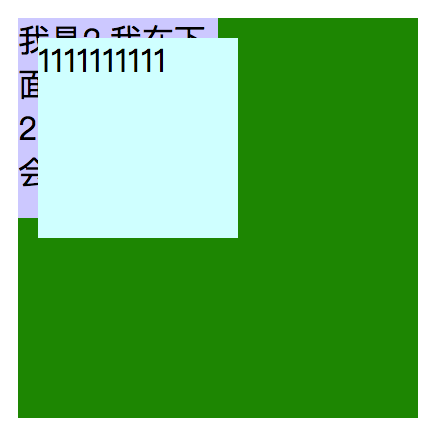
加上margin/padding/border之后的布局
记住一点,absolute是相对第一个被定位的祖先元素。加上margin/padding/border之后,也是在这些属性起作用之后,再来计算absolute。
<div style="width: 200px; height:200px; background-color:green; position: relative;">
<div style="width: 100px; height:100px;background-color: #cff;
position: absolute;top: 10px; left: 10px;margin: 10px; padding: 10px;border: 10px solid red;">
1111111111
</div>
<div style="width: 100px; height:100px; background-color: #ccf;">
我是2,我在下面 .....我是2,。我在下面,会被覆盖?
</div>
</div>
加上margin/padding/border之后,absolute定位的对比图:
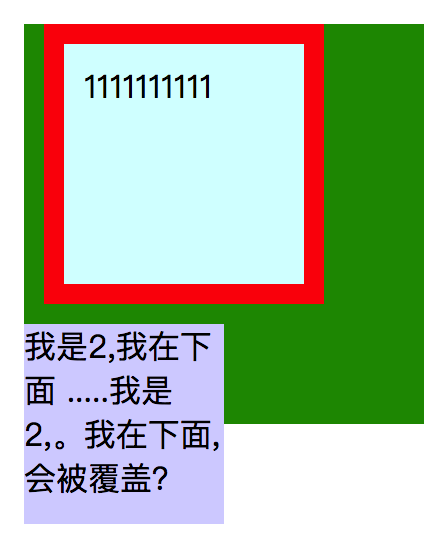
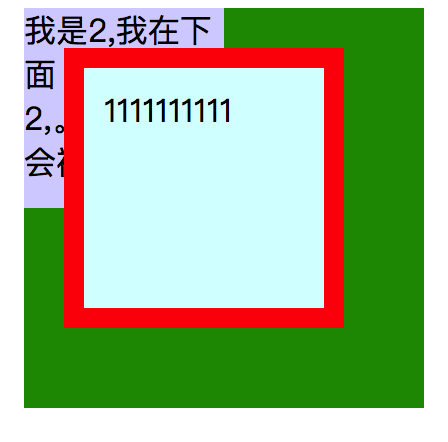
fixed 固定定位
位置被设置为 fixed 的元素,可相对于浏览器视口(viewport)进行定位。不论窗口滚动与否,元素都会留在那个位置。工作于 IE7(strict 模式),低版本的IE不支持。此元素的位置可通过 "left"、"top"、"right" 以及"bottom" 属性来规定。`fixed`属性会创建新的层叠上下文。当元素祖先的`transform`属性非`none`时,容器由视口改为该祖先。
正常情况的定位,请看最后的例子。这里着重说下transform属性非none值时候,fixed的表现。transform属性向元素应用2D 或 3D 转换。该属性允许我们对元素进行旋转,缩放,移动或倾斜。
<div style="transform: rotate(10deg); width: 200px; height: 200px; border: 1px dotted red;">我定义transform属性
<div style="position: fixed; left: 50px; bottom: 100px; border: 1px solid red; background-color: #ffc;">
我是第二个fixed,我在哪里?我使用fixed定位
</div>
</div>
体现的布局:
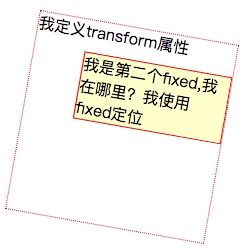
从此图中,可以看出。fixed定位是相对于父元素有transform属性非none值来决定的。
sticky 粘性定位
盒位置根据正常流计算(这称为正常流动中的位置),然后相对于该元素在流中的 flow root(BFC)和 containing block(最近的块级祖先元素)定位。在所有情况下(即便被定位元素为 table 时),该元素定位均不对后续元素造成影响。当元素 B 被粘性定位时,后续元素的位置仍按照 B 未定位时的位置来确定。position: sticky 对 table 元素的效果与 position: relative 相同。
注意的点
- 这里的几个属性,都可以理解为相对定位,只是参照物不一样。
relative,参照物为自己。
absolute,参照物为有定位(非static定位)的父元素。
fixed, 参照物为浏览器的视口。
sticky,参照物为浏览器视口。设置不同方向的值,会粘住于不同方向。 - 我们知道html和body元素相差有8px。relative和static方式在最外层时是以body标签为定位原点的,而absolute方式在无父级是position非static定位时是以html作为原点定位。
- sticky 粘性定位,须指定 top,right,bottom和left四个阈值其中之一,才可使粘性定位生效。否则其行为与相对定位相同。
- 如果只设置position属性,覆盖程度:relative > fixed > absolute > sticky > static,relative会在最上面。(关于这一点,还是有点点疑惑的,为什么会这样,或者为什么不是这样)
此文档对应的例子
https://codepen.io/weiqinl/pen/BqeQoQ
里面有position各种属性的情况。
参考资料
感谢您的认真阅读,更多内容请查看:
出处:http://www.cnblogs.com/weiqinl
个人主页http://weiqinl.com
github: weiqinl
简书:weiqinl
您的留言讨论是对博主最大的支持!
本文版权归作者所有,欢迎转载,但未经作者同意必须保留此段声明,且在文章页面明显位置给出原文连接,否则保留追究法律责任的权利。
出处:http://www.cnblogs.com/weiqinl
个人主页http://weiqinl.com
github: weiqinl
简书:weiqinl
您的留言讨论是对博主最大的支持!
本文版权归作者所有,欢迎转载,但未经作者同意必须保留此段声明,且在文章页面明显位置给出原文连接,否则保留追究法律责任的权利。


